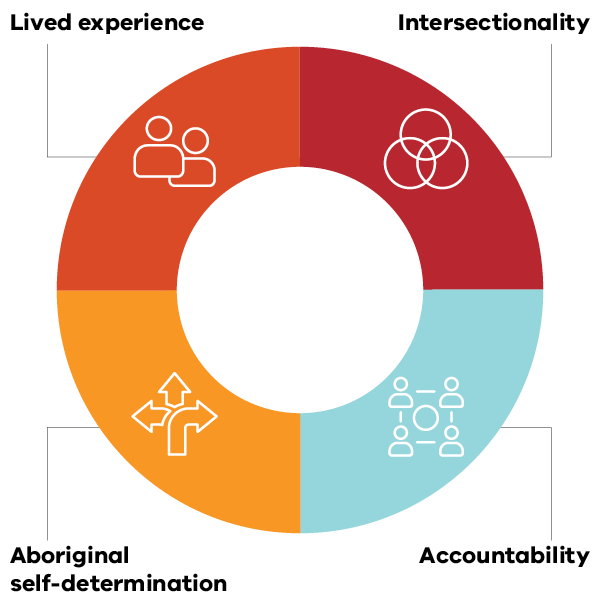Our work and this plan are guided by a set of 4 core principles:
- lived experience
- intersectionality
- Aboriginal self-determination
- accountability.
These principles are ongoing commitments that underpin our response to family and sexual violence.

Actions right across this plan will be shaped by the lived experience of victim survivors in how they are designed, put in place and evaluated.
It is important to listen to victim survivors and to incorporate their lived experiences into program design, development and improvement.
– Women with Disabilities VictoriaPeople with lived experience of violence are central to our ongoing efforts to end family and sexual violence. They know better than anyone the challenges people can face when seeking safety from violence, such as:
- finding a safe place to live
- getting intervention orders
- making sure there is enough money for the essentials.
They understand the road to lasting safety and healing can be long.
Since 2016, we have benefited from the expertise of the members of the Victim Survivors’ Advisory Council (VSAC). They have helped guide Victoria’s strong approach to preventing and addressing family and sexual violence. Their views and guidance have been instrumental in developing this plan.
We have also listened to young people with lived experience of family violence, through VSAC and broader consultation.
We understand that special care is needed when engaging with children and young people. We are committed to finding ethical, trauma-capable ways of learning from them and hearing their views. This will not only work to empower children and young people but will also help improve the design of services to better meet their needs.
This plan also recognises the continued importance of supporting and empowering people with lived experience who work in:
- family and sexual violence services
- other roles in the broader services system.
Intersectionality refers to the ways that different parts of a person’s identity can result in overlapping forms of discrimination and marginalisation.
An intersectional lens can help us understand how this overlapping prejudice and discrimination can make it harder for some people to get the help they need.
We know that every person’s experience of violence is different. It can be affected by a range of factors, including:
- age
- gender
- sexuality
- disability
- faith
- language group
- a combination of these factors.
Attitudes, systems and structures in society and organisations can create inequality and result in barriers and exclusion. This includes experiences of:
- stigma
- sexism
- racism
- homophobia
- transphobia
- intersex discrimination
- ableism
- ageism.
Multiple forms of discrimination can intersect to disadvantage some people even further. When these experiences combine, there is a greater risk of:
- people experiencing family violence
- people not getting the help they need due to systemic barriers
- social isolation.
Intersectionality reminds us of the benefits of policies and services being more inclusive, responsive and fair for all.
In the last few years, we have quickly scaled up services to prevent and respond to family and sexual violence. We will continue refining these services to make sure they work for everyone. This includes tailoring services to meet the particular needs of people and families.
Every Victorian should feel seen and understood in our plan to end family and sexual violence.
By ensuring an intersectional lens is applied across all priority areas and their relevant activities, this will ensure the next phase of Victoria’s family violence work is truly supporting and engaging the most vulnerable in our community.
– inTouch Multicultural Centre Against Family ViolenceAboriginal communities and leaders in Victoria have been working for a long time to address the effects of family and sexual violence and intergenerational trauma on their people. They understand their communities best and what is needed to support them.
Their knowledge, strength and voices are crucial to achieving our goals. They must continue to be at the heart of efforts to end family violence and its devastating impact on Aboriginal people, families and communities.
Aboriginal-led programs that support people to heal their trauma in their own way and on their own terms are crucial for the wounds of trauma to heal. Central to healing is culture, which creates the foundation for identity, growth, and connection with community.
– Balit Durn Durn Centre (VACCHO)In the context of a national crisis of violence against Aboriginal women and children, the 2024 Senate Inquiry into Missing and Murdered First Nations Women and Children reaffirmed the need for genuine partnership with Aboriginal communities to enable self-determination. It emphasised the need to address the systemic drivers of violence – including racism, discrimination and intergenerational trauma – to support the safety and dignity of Aboriginal women and children.
Self-determination underpins Dhelk Dja, which is an Aboriginal-led agreement with the Victorian Government to address family violence in Aboriginal communities. Dhelk Dja’s vision is for Aboriginal people to live free from family violence. It commits services and government to work together to make sure Aboriginal people, families and communities are stronger, safer, thriving and free from family violence.
Dhelk Dja is supported by 3-year action plans. The second of these action plans is due to finish in 2025. The third 3-year action plan (2026 to 2028) will be developed by the Dhelk Dja Partnership Forum using a collaborative, Aboriginal-led agreement-making process.
Dhelk Dja is an important step in a longer journey. This journey will continue as we move towards Truth and Treaty.
Accountability emerged as a strong theme in our consultations and in the national conversation about family and sexual violence in recent years. This principle highlights the accountability of adults who use violence.
To truly eliminate family violence, we need to place those who are at the root of the problem in the centre of the frame – those who choose to use violence.
– Victim Survivors’ Advisory Council, Strong FoundationsHolding adults who use violence accountable is critical to stopping violence.
This principle also reflects the accountability that each person holds in addressing family violence. It cannot be up to victim survivors and advocates to solve this problem.
The Victorian Government will hold itself accountable by meeting our commitments and achieving our goals around ending violence.
Accountability must be upheld at every level. We must all do our part.
This involves:
- providing education to prevent violence
- funding frontline services
- making sure our laws work as intended
- being transparent when reporting on our performance.
Police have an important role in protecting victim survivors from harm and making sure people who use violence are held accountable for their actions.
Specialist services are also vital in turning policies into action by giving direct support to communities. They need to maintain high service and practice standards and continue to train and support their staff to be the best they can be. This includes making sure their services are culturally safe, accessible and responsive.
Beyond these, we all have a role to play in ending family and sexual violence, including:
- the broader range of community services
- the private sector
- communities
- family and friends.
An inter-connected system of accountability wherein the government, the broader service system, community, and society work together, alongside individuals’ change making journeys, [is critical] to stop family violence.
– No to Violence
Updated
